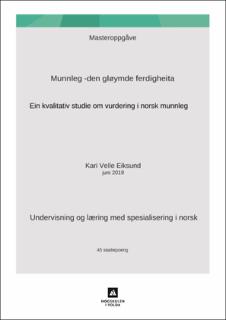Munnleg : den gløymde ferdigheita. Ein kvalitativ studie om vurdering i norsk munnleg
Master thesis
Permanent lenke
http://hdl.handle.net/11250/2644724Utgivelsesdato
2019Metadata
Vis full innførselSamlinger
Sammendrag
Summary
The theme in this thesis is evaluation in oral Norwegian at the secondary school level. My topic question is: How do teachers at Secondary Schools report their evaluations in oral Norwegian?
The research consists of collected data from depth interviews and observations of three experienced Norwegian teachers, which makes it a qualitative research. I have had a closer look at how teachers report their summative and formative evaluations of their students in oral Norwegian, and what kind of challenges they meet in their work.
I have studied their methods of evaluation of presentations, conversations and the listening skills. Having the basis document in the contemporary Norwegian subject curriculum and the Norwegian Education Act as a starting point as well as didactic theories of evaluation of oral skills, I have studied their teaching and their methods of evaluating the pupils. Scientific research shows that pupils’ presentations are emphasized when teachers evaluate the oral skills of their pupils, and other genres not so much. However, research also shows that this changes, and teachers are now to a certain extent using a broader criteria system.
The study shows that presentations are more emphasized than other oral genres. Furthermore, it seems to be more challenging to evaluate students’ conversations, and that the informers measure this differently. It also varies a lot among the informers/participants how much they evaluate listening, and it is not clear to them if listening should be a part of the oral Norwegian assessment basis at all. The results show that even if the informers are conscious of the ideal wide perspective of assessment basis, they tend to become very limited in their own work with evaluations of the oral Norwegian skills as proved in earlier researches. All of the informers have a lot of reflections on how to vary their methods both in formative summative assessments. However, I discovered that there is a distance between what they wish to achieve and what they actually do when they evaluate.
My study shows that the informers probably lack the means of competence in order to manage a complete practice of evaluation in the oral Norwegian skills. I also find the teacher’s participant of a school based assessment community important in order to achieve a complete evaluation in the oral Norwegian subject Samandrag
Temaet i denne oppgåva er vurdering av norsk munnleg på ungdomsskulen. Problemstillinga mi er: Korleis rapporterer lærarar på ungdomsskulen at dei vurderer i norsk munnleg?
Undersøkinga er bygd på innsamla datamateriale frå djupneintervju og observasjon av tre erfarne norsklærarar, altså ein kvalitativ studie. Eg har undersøkt korleis lærarane seier dei vurderer elevane i norsk munnleg, både formativt og summativt, og kva for utfordingar dei møter med vurdering av denne delen av norskfaget.
Eg har valt å undersøkje korleis lærarane rapporterer at dei vurderer framføringar, samtalar og lytting. Med utgangspunkt i grunnlagsdokument som læreplanen i norsk og opplæringslova, samt teori om vurdering og om munnleg kommunikasjon, har eg sett på undervisning og vurdering av norsk munnleg. Forskinga på feltet viser at det er framføringar som er mest vektlagt i vurderinga, og at andre munnlege sjangrar er mindre vanlege som vurderingsgrunnlag. Vurderinga som vert gitt er stort sett positiv og lite konkret, sjølv om kvaliteten på dei munnlege arbeida varierer. Forsking viser likevel ei utvikling her, mot ei meir systematisk vurdering i norsk munnleg, med meir bruk av vurderingskriterier.
Studien viser at framføringar vert meir vektlagt i vurderinga enn andre munnlege sjangrar. Vidare viser det seg at samtalar er utfordrande å vurdere, og at informantane vurderer samtalane på ulike måtar. Det er også stor skilnad blant informantane i kva grad lytting vert vurdert, og om det i heile tatt skal takast med som ein del av vurderingsgrunnlaget i norsk munnleg. I tillegg viser resultata at sjølv om informantane er medvitne om at vurderingsgrunnlaget skal vere breitt, vert vurderinga av norsk munnleg likevel for snevert, med utgangspunkt i læreplanen, noko også tidlegare studiar har vist. Informantane har alle mange refleksjonar rundt vurdering av munnleg kompetanse, og brukar varierte metodar for vurdering, både formative og summative. Eg ser likevel at det er varierande samsvar mellom kva informantane ønskjer å få til og kva dei kjenner at dei får til i vurderinga.
Her viser studien min at informantane truleg manglar verktøy for å få til ein heilskapleg vurderingspraksis av munnleg kompetanse i norskfaget. Eg finn også at læraren er viktig, saman med eit fungerande vurderingsfellesskap på skulane for å få til ei mest mogleg heilskapleg vurdering i norsk munnleg
